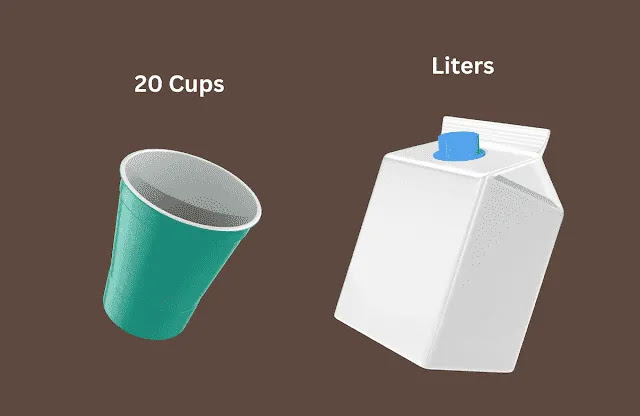20 Cups to Litersr
In the realm of cooking, accuracy is critical to accomplishing flavorful and predictable outcomes.
Despite the fact that it's not unexpected to go over recipes that utilize various units of estimation.
To help you navigate this culinary challenge, we present a handy conversion guide for converting 20 cups to liters.
With this knowledge, you'll be able to confidently adapt recipes, ensuring foolproof cooking every time.
Understanding the Basics:
Before we delve into the conversion process, let's establish a basic understanding of the units involved: cups and liters.
Cups:
Cups are a widely used measurement unit in the culinary world, especially in North America.
Commonly utilized for estimating dry fixings like flour, sugar, and grains, one cup is identical to roughly 236.59 milliliters or 0.24 liters.
Liters:
Liters, then again, are important for the decimal measuring standard and are utilized all around the world.
They are primarily employed for measuring liquids and larger quantities of ingredients. One liter is equivalent to 1000 milliliters or 4.23 cups.
Converting 20 Cups to Liters:
To convert 20 cups to liters, follow this simple formula:
Liters = Cups × 0.24
Applying this formula to our specific case:
Liters = 20 cups × 0.24
Liters = 4.8 liters
So, 20 cups is equal to 4.8 liters.
Tips for Foolproof Cooking:
Now that you understand how to convert 20 cups to liters, here are some additional tips to ensure foolproof cooking:
Use reliable measuring tools:
Invest in high-quality measuring cups and spoons to ensure accurate measurements. Correct measurements are important to get desired results.
Familiarize yourself with recipe conversions:
Some recipes may use different units of measurement. Familiarize yourself with conversions between cups, ounces, grams, and liters to adapt recipes without confusion.
Adjust for ingredient density:
Different ingredients have varying densities, which can affect their volume and weight.
When measuring ingredients by volume, keep in mind that the weight may differ. Try using a kitchen scale to get precise accuracy.
Keep track of modifications:
If you adjust a recipe's measurements, make sure to note the changes. This way, you can recreate successful dishes consistently and fine-tune them to your liking.
Conclusion:
Converting units of measurement is a valuable skill that can enhance your cooking experience.
In this article, we have provided a handy conversion guide for converting 20 cups to liters, allowing you to adapt recipes and achieve foolproof cooking results.
Remember to use reliable measuring tools, familiarize yourself with recipe conversions, consider ingredient density, and keep track of modifications.
With these tips, you'll be well-equipped to create delicious and consistent dishes in your kitchen. Happy cooking!



.png)

.png)

.jpg)
.png)
.png)


0 Comments